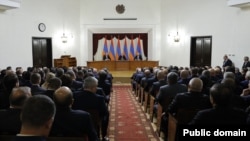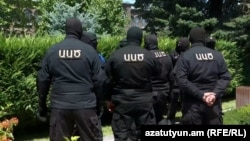Pashinian has been pressuring Catholicos Garegin II and other high-ranking clerics to resign, saying that they have had secret sex affairs in breach of their vows of celibacy. He pledged on June 9 to set up a body tasked with deposing the supreme head of the Armenian Apostolic Church accused by him of having fathered a child.
Opposition and public figures have called the move unconstitutional, arguing that the church is legally separated from the state. They say that the real purpose of campaign, which has involved profanities posted on Pashinian’s Facebook page, is to please Azerbaijan and Turkey and neutralize a key source of opposition to far-reaching concessions to Armenia’s arch-foes.
An RFE/RL correspondent asked Pashinian about the sources of his allegations when she attended at the weekend his and his wife’s latest meeting with supporters held as part of their government-funded campaign purportedly aimed at helping Armenians become more educated.
Pashinian replied that sensitive details of clerics’ private lives have been contained in intelligence briefings presented to him by the NSS, the former Armenian branch of the Soviet KGB, on a daily basis.
“Every day the National Security Service submits to me reports about the operational situation in the country and in that operational situation, naturally, there are security-related issues and related problems,” he said. “Naturally, I cannot help but know all of that. And my knowing is also absolutely legal.”
Pashinian did not say just how the alleged affairs of Garegin or any other priest are connected to national security. Civil rights activists insisted on Monday that there is no such connection and that the premier admitted to serious breaches of privacy protected by Armenian law.
“No one's personal sex life can be part of that operational information,” Nina Karapetiants, head of the Yerevan-based Helsinki Association, told RFE/RL’s Armenian Service.
The NSS or police are allowed to spy on only individuals suspected of crimes, she said, adding that Pashinian has no right to access personal data collected by them.
“That data is confidential, and he has no right to access it. It is prohibited by law,” agreed Arman Tatoyan, the country’s former human rights ombudsman close to the Armenian opposition.
Pashinian broke the law by not only accessing such data but has also publicizing it for “political purposes,” Tatoyan said in a social media post.
Pashinian reportedly acknowledged the NSS surveillance when he met with Yerevan State University (YSU) students and professors on June 2 to promote his controversial policy towards Azerbaijan.
“He said he instructed special services to find out whether Garegin II complies with his vows of celibacy and that the same checks must also be done on the heads of the dioceses and so on,” one of the students told an Armenian TV channel afterwards.
Late last year, Pashinian also controversially accessed personal communication of Hovik Aghazarian, an Armenian parliamentarian who defied his order to resign from the National Assembly. The data, which included intimidate details of Aghazarian’s private life, was stored in Aghazarian’s mobile phone confiscated by another law-enforcement agency. Pashinian shared it with senior members of his Civil Contract party before they decided to expel Aghazarian from its ranks.
Aghazarian protested against the embarrassing leak which he considers illegal. Pashinian denied breaking the law, saying that law-enforcement authorities passed Aghazarian’s personal data on to him after finding there “information containing threats to state security.”







